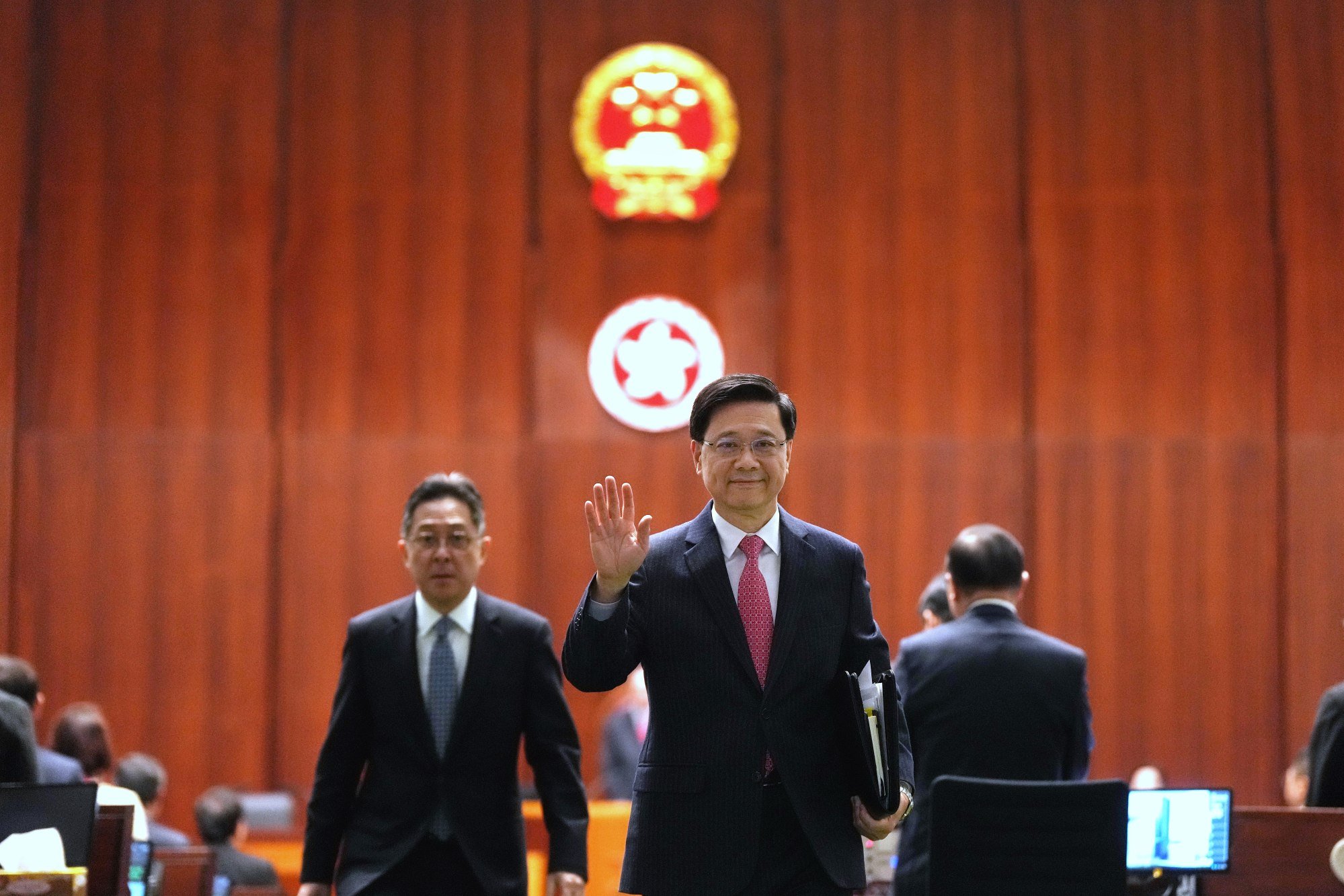‘Rebuttal team’ to be set up to fight expected attacks on Hong Kong’s home-grown national security legislation, city leader John Lee says
“We will set up a rebuttal team in this area, especially on social media, to tell people the truth.”

Lee made the pledge during a question and answer session that focused on boosting the economy with major events and Article 23 of the Basic Law, Hong Kong’s mini-constitution, which requires the city create its own national security law.
A previous attempt at legislation failed in 2003 after strong opposition and demonstrations in the streets.
But Lee added the events of that year probably happened because Hong Kong people were “overly gentlemanly” and did not know there were so many “villains” around the world keen to attack the city until the 2019 social unrest acted as a wake-up call.
The Post has learned that authorities are expected to begin consultation next month for the city’s own national security legislation. It is expected to broaden the scope of offences beyond those already included in the 2020 legislation.
Lee said he and the justice and security secretaries would form a “core team” in charge of publicity efforts on the city legislation.
Chief Secretary Eric Chan Kwok-ki, the city’s No 2 official, and Paul Chan Mo-po, the finance chief, will give coordination support.
Among Lee’s major messages to the international community is that Hong Kong has only a fraction of the national security safeguards of many Western countries.
Hong Kong’s own national security law on the cards for 2024: legislative agenda
Research by city authorities found that the United States had 21 pieces of related legislation and Britain had 14.
“The laws recently enacted in Britain are very strict from the perspective of national security,” Lee said. “One government official, which should be a secretary of state, can disapprove a person to open a [bank] account and even ask him to take a polygraph test for national security reasons.”
Lee added legal safeguards against treason and ties with foreign political bodies in Hong Kong were insufficient.
He said the legal framework for national security was like a car “still missing many parts”, but warned that “hostile forces are watching and waiting for opportunities”.

He also appealed to lawmakers and experts to join the lobbying efforts and said that Regina Ip Lau Suk-yee, the convenor of key decision-making body the Executive Council, had put forward well-reasoned arguments in overseas media interviews.
“The sooner we complete the Article 23 legislation and put a full stop to this issue, the sooner we can concentrate on developing the economy and improving people’s livelihoods,” he said, adding he did not reveal a timeline for the consultation process.
A government source earlier suggested that authorities would not adopt the white bill approach for the consultation, which meant that a draft of the law would not be available as part of the process of canvassing the views of the public.
The 10 lawmakers who spoke in the Article 23 session were all supportive of the legislation.
Ip advised Lee to learn from British national security legislation and adopt a flexible “code of practice” to tackle fast-changing tactics.
National security law put city ‘back on track’, Hong Kong No 2 official tells UN
But Ip, who was responsible for the withdrawn 2003 legislation while secretary for security, told the Post after the session that it was premature to suggest ways to dispel doubts as details of the new bill were unavailable.
She maintained the argument of having more clarity through a white bill consultation was a 2002 “red herring” from the opposition designed to stall the government.
Ryan Mitchell, an associate professor of law at the Chinese University of Hong Kong, said a comparison with British national security legislation was of limited relevance because of the many differences in context.
He added that “in any case the UK’s legislation has also been justly criticised on several grounds”.
Mitchell, an expert in public law, said there were no hard and fast rules on when to use a white bill approach, but that “erring on the side of more transparency would help to reassure public sentiment as well as the international business community”.
The Chinese General Chamber of Commerce backed the proposed legislation, but appealed to the government to provide “clear provisions” of the proposed bill over the consultation to minimise the chance of disputes or the need for interpretation by the country’s top legislative body.
The chamber said it also hoped the authorities would give clear explanations to overseas stakeholders on the benefits of the new law “to reduce overseas investors’ concerns and misjudgments”.